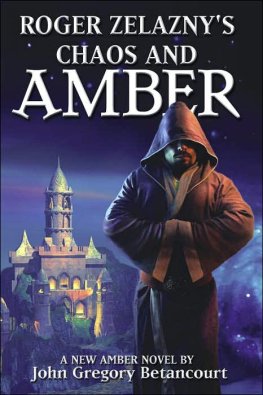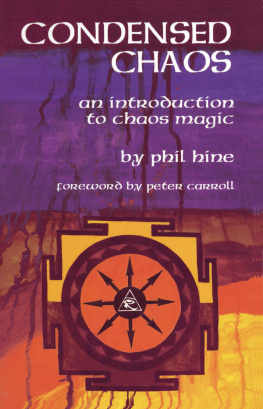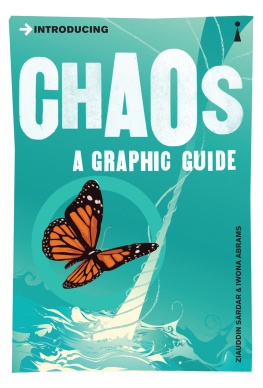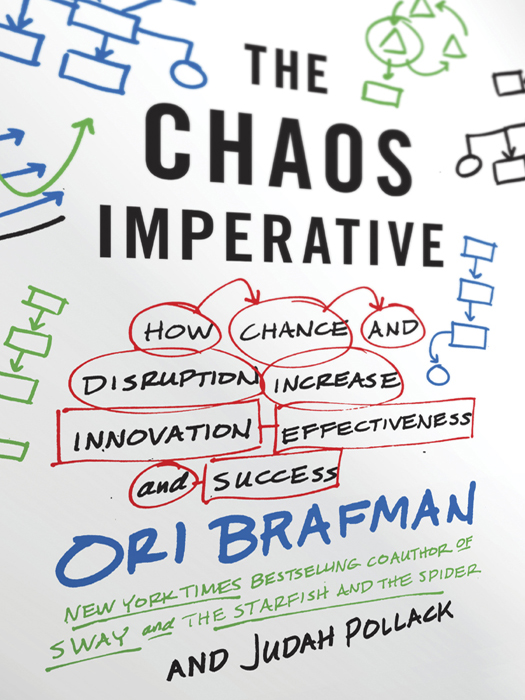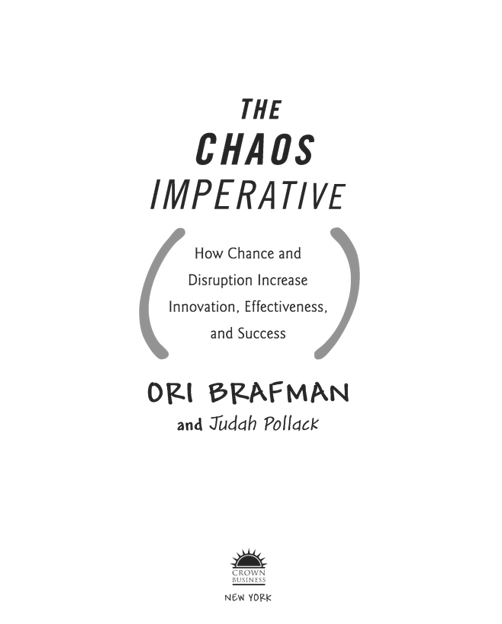ALSO BY ORI BRAFMAN
Click: The Magic of Instant Connections (with Rom Brafman)
Sway: The Irresistible Pull of Irrational Behavior (with Rom Brafman)
The Starfish and the Spider: The Unstoppable Power of Leaderless Organizations (with Rod A. Beckstrom)
Copyright 2013 by Shechinah Inc.
All rights reserved.
Published in the United States by Crown Business, an imprint of the Crown Publishing Group, a division of Random House, Inc., New York.
www.crownpublishing.com
CROWN BUSINESS is a trademark and CROWN and the Rising Sun colophon are registered trademarks of Random House, Inc.
Library of Congress Cataloging-in-Publication Data
Brafman, Ori.
The chaos imperative / Ori Brafman and Judah Pollack.
pages cm
1. Organizational effectiveness. 2. Chaotic behavior in systems. I. Pollack, Judah. II. Title.
HD58.9.B7333 2013
658.401dc23 2013016803
eISBN: 978-0-307-88669-9
Jacket design by Base Art Co.
v3.1
To Hilary Roberts,
who brings order to the chaos
Contents
Ron Ricci at Cisco Systems claims there are two types of communicators in life: the up-front, bottom-line crew, and the people who like to tell a good story and provide you with the evidence before arriving at their thesis. Ron refers to the two groups as deductive communicators and inductive communicators, respectively. I am an inductive communicator, Ive come to realize. I typically hate jumping straight to the bottom line. Especially in a book about chaos, of all things. I much prefer making my case with a good story.
But for all you deductive communicators out there, here is the bottom line, up front: we all need what I call contained chaos in our lives and careers. We can gain immeasurably from conducting a meeting with absolutely no agenda or from bringing unusual suspects into the fold. My research has shown that a certain amount of chaos supports what I call organized serendipitywhere new and creative ideas seem to emerge out of nowhere.
Surprisingly, chaos makes us more effective in our careers. It makes for better school systems, more innovative businesses, and, as my work with the U.S. Army has shown, even a more resilient military.
So thats the bottom line. Now let me tell you a story.
Make It Matter
I was sitting in an office with General Martin Dempsey months before he became the chairman of the Joint Chiefs of Staff. He wanted to know if I could help him.
In his late fifties, with close-cropped white hair and wearing his combat uniform, Dempsey certainly looked the part of a top military officer. But as I began talking to him, he didnt exactly fit the stereotype I had in my mind. Hes affable, well versed in literature and the classics, soft-spoken, down-to-earth, and quick to smile.
I met General Dempsey in his office at Fort Monroe, Virginia. It was a long, rectangular room in which every wall was decorated with plaques, ceremonial swords, and photos taken on the battlefield.
Three days earlier, I had been sitting on a Northern California lawn overlooking an organic garden, wearing shorts and flip-flops, and talking to my San Francisco friends about the importance of setting a vibe at a music camp-out (where several hundred people take to the woods, hauling a bunch of speakers and power sources with them, and DJs spin in the forest).
Now here I was, still a little sunburned, on a military base on the East Coast. There was nothing touchy-feely about the swords hanging on the wall. The steel was sharp, spotless, and very real. I felt more than a little out of place. My only prior exposure to the military had come from watching Hollywoods war movies and from seeing soldiers carrying Uzis when I was a young kid in Israel, before my family moved to the United States. (My father was such a poor fit for the Israeli military that he was assigned to a kibbutz for his compulsory service and spent his time harvesting bananas.) I majored in peace and conflict studies at the University of California at Berkeley. I live in San Francisco and Im a vegan.
Walking to General Dempseys office that morning, Id realized that I didnt know any of the proper etiquette. Do you salute a general? (You dont if youre a civilian.) Do you call him sir? (I called him Marty.) Do you monitor your language? (I didnt, and neither did he.) I hadnt even known what the four stars on a generals uniform meantId had to look it up on Wikipedia.
We sat across from each other on comfortable brown leather couches. It was an informal meeting, but just a few feet away, seven members of his uniformed staff were taking copious notes. It was as if a team of highly trained soldiersready to respond to any situation or surprise attackwere documenting your visit to your uncles house.
I was on a trip, he told me, reading your first book, The Starfish and the Spider, and I immediately turned to one of my officers and said that I really wanted to meet you, because I think you can help me with something very important. Id later learn that as I was living my life in San Francisco, people in the highest echelons of the Pentagon were using my theories to try to understand how to counter terrorism and how to dramatically change the nature of the military. But more on that in a bit.
As Dempsey and I talked about his time as one of the top commanders in charge of the Iraq war, I noticed a rectangular wooden box about the size of a shoebox on the coffee table between us. There was something about it that captured my attention: it was simple but carefully constructed, and it was one of the only objects in the room that was closed. I asked him what was inside. It turned out that the boxs contents represented the reason he was asking for my help.
He opened the box and pulled out what looked like baseball cards. But instead of a picture of an athlete, each card bore a photo of a soldier in uniform. These are all the soldiers, Dempsey told me, who died in action under my command. The inscription on the box stated simply, Make It Matter. Dempsey still keeps in touch with the soldiers families. As he handed me card after card, it seemed as if they collectively represented the weight of his responsibilities.
Dempsey was rather beloved by the troops. He wasnt your usual hard-nosed, the-world-is-the-way-that-I-see-it autocrat. Earlier in his career hed been an English professor at West Point, and his students remember his special fondness for Shakespeare. When he served in Iraq, his division was ready to go home after a long tour of duty and was literally at the Kuwaiti border when, at the last minute, it was ordered to stay another few months to take part in the attack on Fallujah, which would turn out to be one of the most difficult and bloodiest battles of the Iraq war. Dempsey is famous for the speech he gave to inform his troops that although they had done their duty, they were not going home yet: instead of sugar-coating the news, he was honest in acknowledging just how difficult the war had been.




